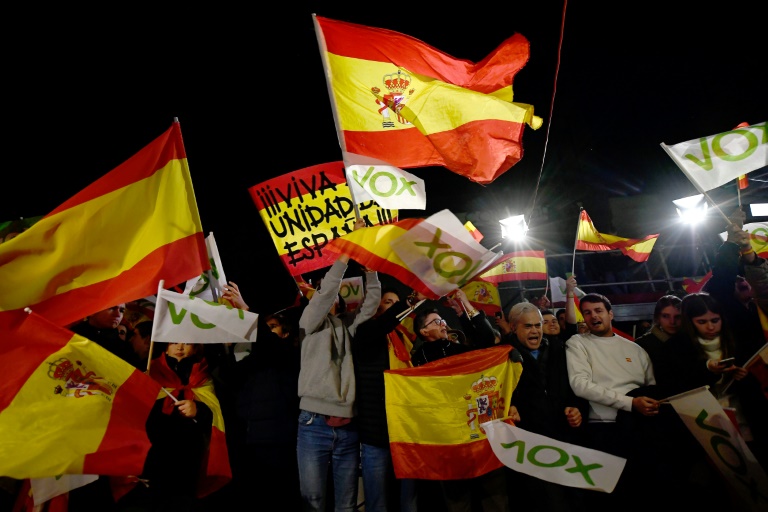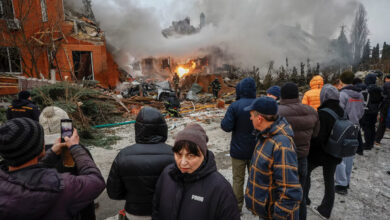
Spain’s Socialists faced tough talks to form a government Monday after the party emerged on top but weakened from a repeat election that produced an even more divided parliament and propelled far-right Vox into third place.
Neither the left nor the right bloc are anywhere near an absolute majority in the 350-seat assembly following Sunday’s polls, prolonging political deadlock in the eurozone’s fourth-largest economy following a similar result in April’s election.
“It will be practically impossible to form a government in Spain… harder than in the past,” forecast Joan Botella, a political scientist at Barcelona’s Autonomous University (AUB).
“All parties have a rival to their left, another rival to their right, and that blocks strategic options.”
Prime Minister Pedro Sanchez triggered the repeat polls — Spain’s fourth in as many years — after his Socialists were unable to ink a deal to forge a parliamentary majority.
But his gamble resulted in the party winning just 120 parliamentary seats — three fewer than in April — while the radical leftwing Podemos fell to 35 seats from 42 the last time around.
Business-friendly Ciudadanos, another potential governing partner, suffered a rout, dropping from 57 to 10 seats and prompting the resignation of leader Albert Rivera.
Podemos leader Pablo Iglesias called for the left to unite, but the two parties would still need the support of several smaller factions to build a working parliamentary majority of 176 seats.
The main opposition conservative Popular Party (PP) recovered from its worst-ever showing in April, finishing second with 88 seats, up from 66.
But Vox was the biggest winner with 52 seats, mirroring recent gains by far-right parties elsewhere in Europe.
The result saw it more than doubling the 24 seats won during its April parliamentary debut, in the most significant showing by the far-right since Spain’s return to democracy following dictator Francisco Franco’s death in 1975.
– Protests in Catalonia –
The deepening Catalan separatist crisis played squarely into the hands of the far right, which has vowed to clamp down on the pro-independence movement that staged widespread mass protests last month after Spain’s top court jailed nine of its leaders over a failed 2017 secession bid.
The activists hit the headlines again on Monday when hundreds began a three-day protest at La Jonquera, cutting the AP7 motorway linking Spain and France and causing transport chaos at a particularly important point for cross-border lorry transport.
Accounting for around 20 percent of Spanish GDP, Catalonia is heavily dependent on exports, with the CETM, which represents the transportation industry, predicting losses of 15 million euros ($16.5 million) per day on a route used by 20,000 trucks.
“For us, it never rains but it pours,” CETM deputy head Dulce Dias told AFP, noting that the cross-border highway had been cut on several occasions since the protests began four weeks ago.
“It’s incredible — it could so easily have been avoided.”
Speaking to reporters a day after his election victory, Vox leader Santiago Abascal slammed the border blockage as “absolutely intolerant”, and insisting that the police “immediately breakup” such illegal demonstrations.
– ‘Third election very possible’ –
In the aftermath of Sunday’s election, talks were focused on the potential alliances for forming a government.
The Socialists would prefer to govern in a minority, which would only be possible if the PP abstained in a parliamentary confidence vote — but with the strengthening of the right, the PP was unlikely to agree.
“PP’s leadership will now likely be more comfortable with the idea of a new election… and therefore even more reluctant to back a Socialist government,” said Eurasia analyst Federico Santi.
“A third consecutive election is now a very real possibility.”
Berenberg Bank economist Holger Schmieding said the real chance for a stable government would likely arise from a coalition of the Socialists and the PP — an option which both sides have ruled out.
“Sanchez looks likely to stay on as prime minister of a minority government until either the parties from different sides of the political divide overcome their inhibitions to work with each other — or new elections next spring,” he said.
Spain has been mired in political paralysis since Podemos and Ciudadanos entered parliament following a December 2015 election that shattered the decades-long hegemony of the Socialists and the PP.
Image: AFP / OSCAR DEL POZO The far-right Vox party was the biggest winner with 52 seats, more than doubling the 24 it took in its April parliamentary debut




